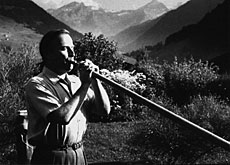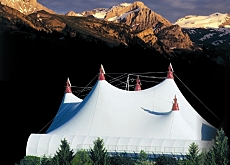Maestro blew alphorn for Switzerland

The man considered the greatest violinist of the 20th century lived out of a suitcase most of his life, giving hundreds of concerts around the world every year. But every summer, Yehudi Menuhin and his family returned to their chalet in Gstaad.
“Isn’t it humbling to be among these wonderful mountains, which embody the overwhelming power of nature and have helped Switzerland become a land of freedom?” Menuhin once said.
The small alpine resort represented the world in a nutshell for this ceaseless traveller, fascinated as he was by a rural region where German and French speakers could co-exist in relative harmony, not far from Italian-speaking Switzerland.
“I have always been impressed by the diversity of minorities,” he admitted. “Minorities in the world of majorities…and no country has been as successful as Switzerland at taking seriously the concerns of its cantons and individual communities.”
It was a conviction he extended to the arts.
The American-born son of Russian-Jewish immigrants came into contact with gypsy music when he studied in Romania as a child, and later with eastern traditions. He played an influential role in introducing yoga to the West and befriended Indian sitar player Ravi Shankar, who was later invited to his Gstaad festival.
He also experimented with the alphorn. “He was open to all kinds of music,” Rolf Steiger told swissinfo.ch.
Steiger is the co-author of a just published book, “Gstaad and the Menuhins”. “We have pictures of him trying to play the alphorn, and the violin lends itself to Swiss folk music.”
Unconventional
The former president of the Menuhin festival and founder of the Menuhin Center is a retired doctor. But Steiger says if the violinist had an ailment, he would not let himself be treated conventionally.
“He was his own physician, with close ties to the [alternative healing] Bircher-Benner clinic in Zurich. He practiced yoga, and was very concerned with what he ate.”
Steiger says he had many friends in Switzerland, but no real friends, supporting what one of his sons once said about him: “There were few people in the world who he really found interesting, but he knew how to make everyone [he came into contact with] feel he was really interested in them.”
It was these people skills he used to great advantage by inviting “friends”, the composer and pianist Benjamin Britten and tenor Peter Pears, to Gstaad to help launch the first festival in 1957, which consisted of just two concerts in a local church.
Chamber music
“When Menuhin was on holiday in the Alps, he performed with friends. Prior to Gstaad, that was the case in the Fextal in the Engadine and in Mürren in 1952. That’s maybe how he heard that there was a small church here ideal for chamber music,” Steiger says.
The festival became an annual event and outgrew the cosy church setting. A large tent was added to hold performances by symphony orchestras and Menuhin developed the idea of starting a music academy in Gstaad.
“He also gave us problems,” Steiger admits. “He always made new demands, such as his idea for the academy. His answer was always, ‘you can do that in Gstaad because you have enough rich people living there’.”
The violinist was eventually able to persuade the locals to found the International Menuhin Music Academy in 1977, but had less luck with his vision for an opera house in the Alps.
“We brought in engineers and architects,” remembers Leonz Blunschi, the current director of the festival. “I told him it was a good idea, but would be difficult to finance.”
This was obviously not to Menuhin’s liking but Blunschi said the artist never held grudges against those he disagreed with. And Menuhin could only be accused of trying to give back to Gstaad what the mountain village had given to him.
He said in 1994: “It was always my dream to live in Switzerland. The country is well governed. The people are neither pompous, aggressive nor brutish. So many languages, so many beautiful areas, mountains, water, meadows and forests. I love nature. A country where there is no war is paradise.”
The Bernese Oberland resort of Gstaad and the surrounding villages have around 7,500 inhabitants.
Around 90% of the population live directly or indirectly from tourism.
However, agriculture is still important to the region, which counts around 90 farms.
The ski resorts are also popular for hiking in summer, and attracts tens of thousands of summer visitors to a wide variety of sporting and cultural events.
Born on April 22, 1916 in New York into a family of Russian-Jewish immigrants.
Gave his first violin solo performance as an eight-year-old with the San Francisco Symphony Orchestra.
During the Second World War, gave over 500 concerts to Allied troops.
Founded the Menuhin Festival in Gstaad and became artistic director of the Bath festival in 1957.
In 1969, elected president of Unesco’s International Music Council.
Appointed “Baronet of Stoke d’Abernon” by Queen Elisabeth in 1993.
Died of heart failure in Berlin on March 12, 1999.

In compliance with the JTI standards
More: SWI swissinfo.ch certified by the Journalism Trust Initiative











You can find an overview of ongoing debates with our journalists here . Please join us!
If you want to start a conversation about a topic raised in this article or want to report factual errors, email us at english@swissinfo.ch.